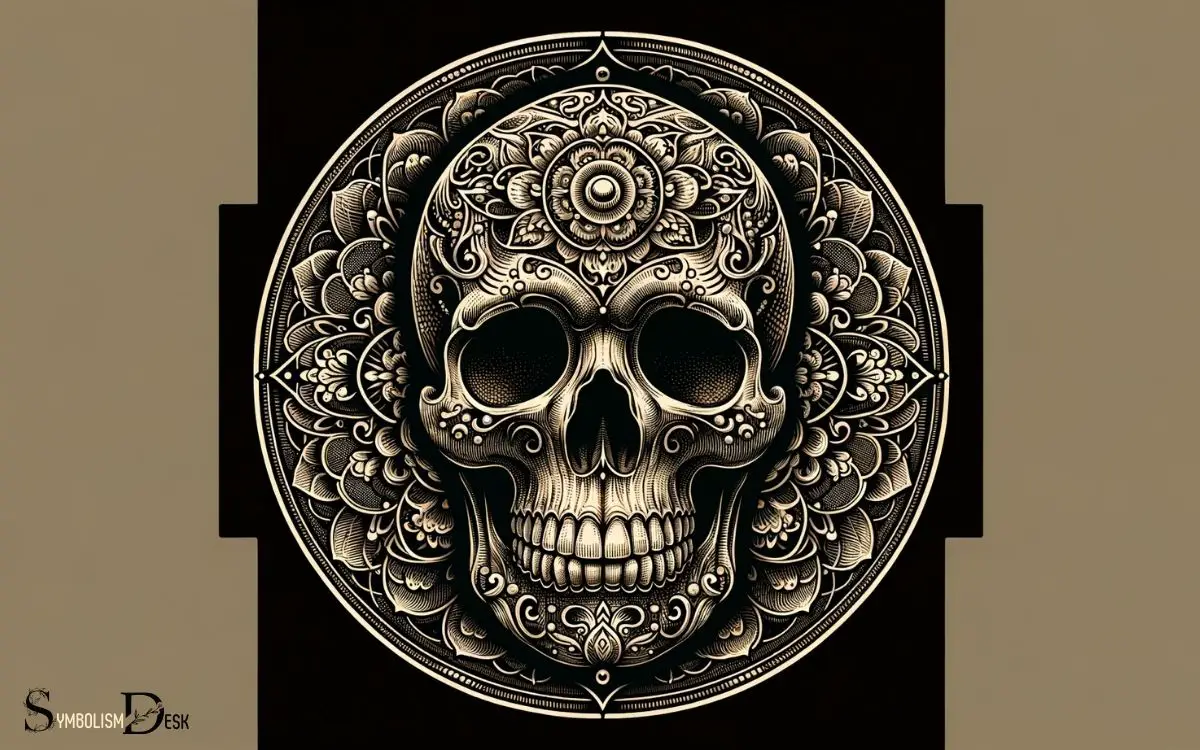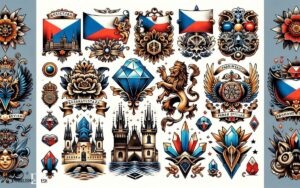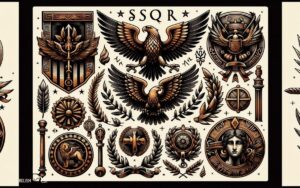What Do Skull Tattoos Symbolize? Mortality!
Skull tattoos are a popular choice in body art, symbolizing a variety of concepts such as mortality, rebellion, change, and the celebration of life.
They often serve as a reminder of the wearer’s mortality or represent a past life, and can also symbolize triumph and rebellion against societal norms.
Skull tattoos carry multiple layers of meaning, often depending on the cultural context and individual beliefs.
Here are some common interpretations:
- Mortality and Death: The most apparent symbolism of a skull is its association with death and the finite nature of life.
- Change and Transformation: Skulls can represent a transformative process or life-changing event.
- Rebellion and Nonconformity: They are frequently used to signify a rebellious spirit and nonconformity to societal rules.
- Power and Strength: In some cultures, skulls are seen as a representation of overcoming challenges or protecting one’s soul.
- Celebration of Life: Contrary to their connection with death, skulls can also represent life and the memory of departed loved ones.
A skull tattoo can be a personal emblem of one’s journey through life’s trials and triumphs.

Key Takeaway
Historical Significance of Skull Tattoos
While skull tattoos have gained popularity in modern times, they have a historical significance that dates back to ancient civilizations.
The use of skull imagery in tattoos can be traced to various cultures throughout history. In ancient Mesoamerican societies, such as the Aztecs and Mayans, skulls held great spiritual and ritualistic significance.
These civilizations often depicted skulls in their art and rituals as a symbol of death and rebirth, emphasizing the cyclical nature of life.
Similarly, in ancient European cultures, skulls were used to represent the fragility of life and the inevitability of death.
Over time, skull imagery in tattoos has evolved to encompass a wide range of meanings, including mortality, protection, and the celebration of life.
Understanding the historical roots of skull tattoos provides a deeper appreciation for their cultural significance in contemporary society.
Cultural Variations in Skull Tattoo Meanings
Skull tattoos symbolize varying meanings across different cultures, reflecting diverse beliefs and traditions.
In different societies, the symbolism behind skull tattoos can be deeply rooted in cultural and historical significance.
Here are some cultural variations in the meanings of skull tattoos:
- Mexican Culture: In Mexico, skull tattoos, known as ‘calaveras,’ are associated with the Day of the Dead festival, symbolizing the celebration of deceased loved ones and the cycle of life and death.
- Japanese Culture: In Japanese tattoo art, skulls can represent the fleeting nature of life and the impermanence of existence, often tied to the concept of ‘memento mori’ and the transience of human life.
- Celtic Culture: Within Celtic traditions, skull tattoos may symbolize the celebration of the afterlife, the spirit world, and the interconnectedness of life and death in the cycle of nature.
Symbolism of Skull Tattoos in Different Religions
In various religious contexts, skull tattoos hold distinct symbolic meanings, reflecting the spiritual beliefs and practices of different faith traditions.
- In Christianity, the skull represents mortality, reminding believers of the fleeting nature of life and the inevitability of death. However, it also serves as a symbol of resurrection and the afterlife, emphasizing the triumph of life over death.
- In Hinduism, the skull, often depicted as Lord Shiva’s necklace of skulls, symbolizes the powerful forces of creation and destruction, embodying the cycle of life, death, and rebirth.
- In Buddhism, the skull is a reminder of the impermanence of life and the transient nature of earthly pleasures, encouraging practitioners to seek enlightenment and liberation from the cycle of suffering.
Each religious interpretation adds depth and nuance to the symbolism of skull tattoos, enriching their cultural and spiritual significance.
Evolution of Skull Tattoos in Contemporary Art
Skull tattoos have evolved significantly in contemporary art, reflecting changing societal attitudes and artistic trends.
From traditional skull imagery to more modern interpretations, contemporary skull tattoos have become a popular form of self-expression.
This evolution in tattoo art mirrors the shifting cultural significance and symbolism of skulls in modern society.
Contemporary Skull Tattoo Trends
Contemporary artists have redefined the traditional symbolism of skull tattoos, incorporating modern styles and interpretations into their designs. This evolution reflects shifting cultural attitudes towards mortality and the afterlife.
Contemporary skull tattoo trends encompass:
- Minimalist Approach: Many artists now opt for minimalist designs, using clean lines and simple imagery to convey the essence of mortality and the transient nature of life.
- Incorporation of Color: Unlike traditional black and white skull tattoos, contemporary designs often feature vibrant and diverse color palettes, symbolizing the celebration of life and the acceptance of death as a natural part of the human experience.
- Integration of Diverse Cultural Influences: Contemporary skull tattoos frequently incorporate elements from various cultural traditions, reflecting a globalized perspective on death and the afterlife.
These trends reveal a shift from the traditional morbid symbolism of skull tattoos towards a more nuanced and culturally diverse interpretation.
This evolution mirrors broader societal changes in attitudes towards mortality and the human experience.
This contemporary shift in skull tattoo trends illustrates a dynamic fusion of traditional symbolism with modern artistic expression, paving the way for a deeper understanding of skull symbolism in art.
Skull Symbolism in Art
The evolution of skull tattoos in contemporary art reflects a dynamic fusion of traditional symbolism with modern artistic expression.
Skulls have been a prominent motif in art for centuries, often representing mortality, the cycle of life and death, and the fragility of human existence.
In contemporary art, the symbolism of skulls has expanded to encompass a wide range of themes, including rebellion, individuality, and the complexities of human emotions.
Artists have reinterpreted the traditional skull imagery, incorporating elements of pop culture, abstract concepts, and personal narratives.
This evolution has led to a diverse array of skull tattoo designs that challenge conventional interpretations and resonate with a broader audience.
The integration of skulls into contemporary art not only pays homage to the rich cultural history of skull symbolism but also propels it into new and thought-provoking contexts.
Personal Interpretations of Skull Tattoos
Many individuals interpret skull tattoos as a representation of mortality and the transient nature of life. Others may view skull tattoos as a symbol of danger, rebellion, or even a celebration of the afterlife. The meaning behind the skull tattoo can also vary depending on the culture and beliefs of the individual getting the tattoo. For example, in some cultures, the skull is associated with protection, strength, and power. On the other hand, in the context of the black widow tattoo meaning, the skull may be seen as a symbol of feminine power and the ability to overcome challenges. Ultimately, the interpretation of skull tattoos is deeply personal and can carry a wide range of meanings for different people.
However, personal interpretations of skull tattoos can vary widely, often carrying profound meanings for the individuals who choose to adorn themselves with this powerful symbol.
- Celebration of Life: Some people view skull tattoos as a celebration of life, a reminder to live each day to the fullest and embrace the present moment.
- Rebirth and Transformation: For others, the skull represents rebirth and transformation, signifying the shedding of the old self and the emergence of a new identity.
- Memento Mori: In certain cultural and philosophical contexts, skull tattoos serve as a memento mori, prompting contemplation on the inevitability of death and the importance of living authentically.
These personal interpretations reflect the complexity and depth of meaning that skull tattoos hold for individuals.
Skull Tattoos as a Representation of Rebellion
Skull tattoos, representing rebellion, are often embraced as a bold statement of nonconformity and defiance against societal norms and expectations.
Throughout history, the skull has been a powerful symbol of rebellion, challenging the status quo and embracing the darker aspects of life. In many cultures, the skull has been used to signify the rejection of authority and the embrace of individuality.
From pirates to biker gangs, the skull has been a recurring motif in counterculture movements, symbolizing freedom and resistance.
In the context of tattooing, the decision to ink a skull represents a deliberate choice to reject mainstream ideals and express a rebellious spirit.
By adorning their bodies with skull tattoos, individuals assert their autonomy and challenge conventional standards, making a powerful visual statement about their rejection of societal constraints.
The Connection Between Skull Tattoos and Mortality
Often associated with the concept of mortality, skull tattoos serve as a stark reminder of the finite nature of life and the inevitability of death.
The connection between skull tattoos and mortality runs deep, encompassing various cultural and historical contexts.
Here are three ways in which skull tattoos symbolize mortality:
- Memento Mori: In art and literature, the skull has long been used as a symbol of mortality, reminding individuals of their own mortality and the transient nature of life.
- Cultural Beliefs: In some cultures, skull tattoos are associated with honoring deceased loved ones and acknowledging the cycle of life and death.
- Personal Reflection: For many individuals, getting a skull tattoo is a way to reflect on their own mortality and embrace the philosophy of living life to the fullest.
Skull tattoos, therefore, carry a profound message about the transient nature of human existence and the importance of embracing each moment.
Conclusion
Skull tattoos have a rich and varied symbolism that spans across history, culture, and religion. They serve as a powerful reminder of mortality and the transient nature of life, while also representing rebellion and strength.
These tattoos have evolved from their historical significance to become a prominent feature in contemporary art, offering individuals a deeply personal way to express their identity and beliefs.
The image of the skull remains a potent and thought-provoking symbol in the world of body art.






